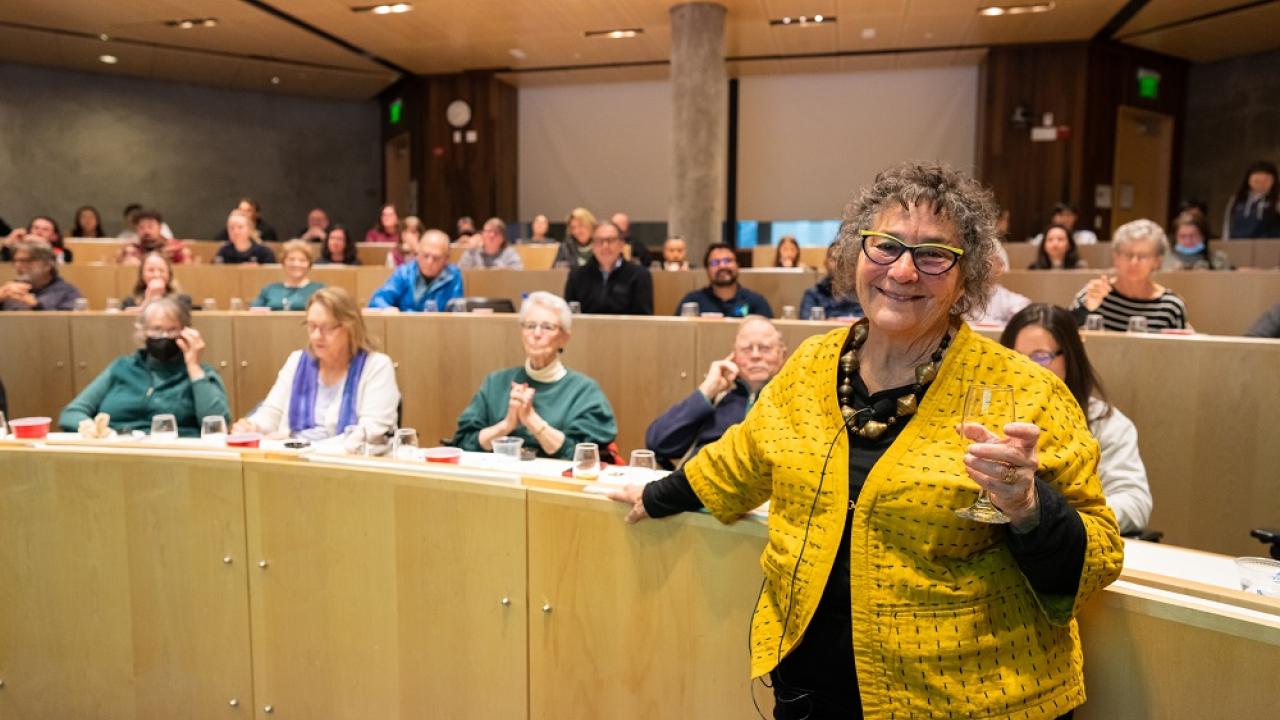
Buzzing off...Back to the HIVE
Director Amina Harris Retires
As the end of summer approaches, so does my tenure at UC Davis as the Honey and Pollination Center director.
In the late fall of 2012, I became the founding director of the Center. Honestly, I had no idea what I was going to do! Things changed quickly, and soon, I was involved in way more programs than I ever thought possible. Everything was about improving the use and understanding of honey or helping folks learn more about bees and pollinators.
UC Davis Honey Aroma and Flavor Wheel
In 2013, I began to work with Sue Langstaff to bring the first-ever US Honey Wheel to publication. Under Sue’s guidance, we brought together 24 tasters from every facet of the food and beekeeping world, 25 honeys from across the globe, and 60 possible reference samples. Folks tasted, wrote down their thoughts, we talked, Sue wrote every word down, and after several meetings and hundreds of words to describe honey – including ‘when the tire hits the road’ – we narrowed it down to 99 and published. Feedback was almost immediate, with interest from both regional and national publications. No one could believe there might be honey that smelled like ‘cat pee.’ Trust me on this: there is more than one!
Bee Symposia
After meeting with faculty in the Department of Entomology, it was decided that the Center would organize a Bee Symposium with nationally or internationally recognized researchers, authors, and UC Davis team members to help educate California’s small-scale and home beekeepers. Working with Mea McNeil, a farmer, a beekeeper, and a freelance writer for the Bee Journals, we filled the UC Davis Conference Center with over 200 attendees to hear keynote Marla Spivak of the University of Minnesota and an assortment of UC Davis entomologists share their research and vision of the future. The Bee Symposium was held annually for five years.
California Master Beekeeper Program
The development of the California Master Beekeeper Program (CAMBP) was always on the agenda. It came to fruition after hiring Dr. Elina Nino in the Department of Entomology and Nematology. For the next few years, funding was sought, curricula written, and interest in the program was created. By 2016, Apprentices were signing up, educational programs were underway, and the Center partially funded a director. Now, the CAMPB is an independent, thriving, and active force for quality beekeeping throughout the state under the direction of Dr. Nino, with two fabulous leaders, Wendy Mather and Kian Nizdik. Check out their website: CAMBP
California Honey Festival
In 2015, the Center was called to a concept meeting with the City of Woodland and a local honey packer, Z Specialty Food, LLC. Within a short time, it was decided to create the California Honey Festival to debut in May 2016 on Woodland’s Main Street. A part-time director was hired, and all the participating partners worked like crazy to make what became Woodland’s premier festival happen. Loads of honey producers, craftspeople, musicians, food vendors, and informational speakers were present as over 15,000 people poured into town. The UC Davis Arboretum and Public Garden and the Honey Center have been the educational heart of this very sweet annual event. Last year, the 501(c)3 that now governs the festival gifted the Center with $10,000!
Honey Education and Research
It was always in our sites to begin research into the many (over 300) varietal honeys produced in the United States and North America. We started with Honey Sensory Programs – three days of education with presentations from leaders in the honey industry, sensory scientists, specialty tasters, and even a chef! Attendees experienced over 35 types of honey during those programs. However, there was no scientific research yet done. Without quantitative analysis, you can’t say what honey tastes and smells like – even if you know! With the help of Alyson Mitchell in the Department of Food Science and Technology and encouragement from professional taster Orietta Gianjorio, we found a small amount of money and began the analysis. Now, the Department of Food Science and Technology staff are taking this research forward using donations from the Ishai Zeldner Memorial Varietal Honey Research Fund and funding from Nature Nate’s Honey Company.
Mead
In 2013, I was challenged by Frank Golbeck, owner of Golden Coast Mead in San Diego, to work with the Department of Viticulture and Enology to create an educational program for the fledgling mead-making industry. After loads of phone calls to leading mead makers – Ken Schramm, Mike Faul, and Peter Bakulic – and speaking at length with Dr. David Block in viticulture and enology, and being enthusiastically supported by Darrell Corti of Corti Bros. Grocery in Sacramento, we were on our way. Our program became a hallmark for mead makers throughout the country and the world. Our courses drew from the mead makers who donated their time, talent, and mead and the intrigued faculty and staff in viticulture and enology. It is exciting to hear from mead makers in the US, Canada, India, Chile, Australia, the UK, and even Tahiti, who returned home and began a mead business. Mead has been continually improving over the decade, finally entering the craft beverage market with creative varieties and improved quality, and continues to grow and develop.
Now, it is time for me to return to my honey roots. I have been involved with honey since the mid-1970s, over 45 years ago. I will work in my family honey business at the HIVE in Woodland, the same honey business I was plucked from 12 years ago to create and found the Honey and Pollination Center.
I look forward to seeing how the research and honey programming evolves at UC Davis over the coming years. I hope to serve as an ongoing resource to the campus community working in this area.
Buzzing off,

Amina Harris
Director, Honey and Pollination Center
